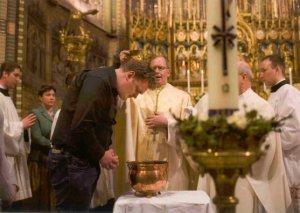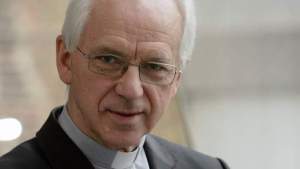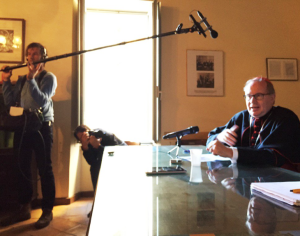Thursday will see the beginning of perhaps the most charged and certainly most anticipated Vatican event in some time: the bishops’ summit on abuse, in which the presidents of the world’s bishops’ conferences, representatives of religious movements and the heads of a number of curia dicasteries will meet over the course of three days to discuss a unified approach to sexual abuse within the Catholic Church. Expectations about its outcome are high, although they may be too high considering the brief length of the meeting and its focus, not on formulating unfified policies – these often already exist – but on getting every single bishop on the same time. After this week, no bishop should have the excuse of saying he did not know of any abuse or how to deal with it.
 On behalf of the Dutch Bishops’ Conference, Bishop Hans van den Hende will attend the meeting in his capacity as the body’s president. The bishop of Rotterdam already met with the pope in December, together with Dr. Wim Deetman, who headed the Dutch investigation into the abuse that took place over past decades. This audience took place out of the pope’s desire to be informed about what the Dutch bishops had done to combat abuse and to compensate the victims. Some have seen that approach as an example for the rest of the world. Bishop van den Hende, in a recent interview, agrees with that, saying, “The joint approach of bishops and religious as it took shape in the Netherlands, in combination with an independent investigation and an independent procedure, is, I think, a good example of recognition and commitment with regards to the victims.”
On behalf of the Dutch Bishops’ Conference, Bishop Hans van den Hende will attend the meeting in his capacity as the body’s president. The bishop of Rotterdam already met with the pope in December, together with Dr. Wim Deetman, who headed the Dutch investigation into the abuse that took place over past decades. This audience took place out of the pope’s desire to be informed about what the Dutch bishops had done to combat abuse and to compensate the victims. Some have seen that approach as an example for the rest of the world. Bishop van den Hende, in a recent interview, agrees with that, saying, “The joint approach of bishops and religious as it took shape in the Netherlands, in combination with an independent investigation and an independent procedure, is, I think, a good example of recognition and commitment with regards to the victims.”
About the expectations of the summit and its outcome, Bishop van den Hende is catious.
“Much will depend on the results of the meeting, that is to say if the goals established by the pope will be fully achieved. You can only come to plans of actions out of the recoginition of the seriousness of the abuse and the joint willingness to come to a true commitment. I am not sure if this can be achieved in the short timespan granted to the upcoming meeting, but it is necessary to take true steps forward in the world Church.”
In another interview, Dr. Deetman showed himself a bit more optimistic:
“I don’t know what the pope plans to do, he did not express himself about that to me. But if Pope Francis, in those four days in Rome, is able to convince the bishops that the abuse is a major problem which concerns the entire Church, and which requires a thorough approach, the meeting will in a sense already have been successful. Then something can be done on a global scale. That also means that a second meeting must soon follow.”
 Dr. Deetman, shown at left while meeting Pope Francis, believes that the Dutch investigation and program of compensation is indeed an example of how things should be done in other locations as well.
Dr. Deetman, shown at left while meeting Pope Francis, believes that the Dutch investigation and program of compensation is indeed an example of how things should be done in other locations as well.
“You must outsource such an investigation [into abuse]. Multidisciplinary and with free access to the archives. I emphasised that to the pope. Also very important: it concerns facts. Make sure that nothing remains swept under the carpet. If you want to properly investigate what went wrong in the various Church provinces and in the Vatican itself, it must be independent, and the results must be made public, with anjustification of the methods of investigation. Without any doubt.”
But Dr. Deetman also urged for caution:
“You must be careful, also when it concerns perpetrators. We have had to conclude that someone had been accused, but it later turned out that he or she could impossible have done it. You do damage someone’s reputation and name. And something else: something may be ‘plausible’, but even then there all kinds of degrees of plausibility”.
This is a good reminder. In recent headline cases in which prelates have been accussed of knowing of the actions of abusers – I mention a Cardinal Wuerl or Farrell – conclusions are drawn before the facts have been studied. This is not something that should be encouraged, although it is understandable when it comes to such horrible acts.
Photo credit: [2] Servizio Fotografico – L’Osservatore Romano
 Early last week, Cardinal Müller was in the Netherlands to speak at a congress about recently canonised Pope Paul VI and Vatican II. Katholiek Nieuwsblad (which, as an aside, has recently been expanding its media work abroad, providing translated articles to
Early last week, Cardinal Müller was in the Netherlands to speak at a congress about recently canonised Pope Paul VI and Vatican II. Katholiek Nieuwsblad (which, as an aside, has recently been expanding its media work abroad, providing translated articles to  Easter is the time for Baptism, and every year, the Church rejoices in welcoming new faithful to her flock. Catholic weekly
Easter is the time for Baptism, and every year, the Church rejoices in welcoming new faithful to her flock. Catholic weekly  “As bishops we realise that you can’t say that, if you are Catholic, there is a single party to vote for. From a Catholic perspective, something can be said in favour of all parties.”
“As bishops we realise that you can’t say that, if you are Catholic, there is a single party to vote for. From a Catholic perspective, something can be said in favour of all parties.” Why single out the PVV, then? Are their positions more abhorent than those of other parties? The tone of their way of doing politics is certainly not one we should promote, and their singling out of parts of the population and disrespect for the rule of law when it does not agree with their positions are indeed problematic. For Bishop de Korte these seem to be decisive factors. For others, like myself, the respect for life (both born and unborn) may be equally decisive, and in that context the left-wing parties such as GroenLinks and SP are just as undeserving of my vote. Singling out the PVV is too simplistic: no party is perfect, and when you say that “something can be said in favour of all parties,” an honest reading wil also show that that includes the PVV.
Why single out the PVV, then? Are their positions more abhorent than those of other parties? The tone of their way of doing politics is certainly not one we should promote, and their singling out of parts of the population and disrespect for the rule of law when it does not agree with their positions are indeed problematic. For Bishop de Korte these seem to be decisive factors. For others, like myself, the respect for life (both born and unborn) may be equally decisive, and in that context the left-wing parties such as GroenLinks and SP are just as undeserving of my vote. Singling out the PVV is too simplistic: no party is perfect, and when you say that “something can be said in favour of all parties,” an honest reading wil also show that that includes the PVV. In the two weeks since
In the two weeks since  In a press conference in Rome, snippets of which were released by
In a press conference in Rome, snippets of which were released by  Yesterday, Bishop Jan Liesen, holding the liturgy portfolio in the Dutch bishops’ conference, wrote
Yesterday, Bishop Jan Liesen, holding the liturgy portfolio in the Dutch bishops’ conference, wrote  All this puts the publisher’s earlier statements – that the bishops had forbidden the use of such songs, and that they had petitioned Rome to issue this ban – in a new light. Simply put: he was talking nonsense. There never has been a ban, and certainly not one planned by the bishops, and the traditional popular Christmas songs may still be used – in their proper place – on Christmas Eve.
All this puts the publisher’s earlier statements – that the bishops had forbidden the use of such songs, and that they had petitioned Rome to issue this ban – in a new light. Simply put: he was talking nonsense. There never has been a ban, and certainly not one planned by the bishops, and the traditional popular Christmas songs may still be used – in their proper place – on Christmas Eve. Before taking the steps to sanction to the Dominican priest, Cardinal Eijk contacted the superior of the order in the Netherlands, Friar René Dinklo (pictured), and asked him to withdraw Fr. Huisintveld from the parish where the liturgical abuse took place, in order to spare him a dishonourable discharge by the cardinal. The Dominican superior refused to do so.
Before taking the steps to sanction to the Dominican priest, Cardinal Eijk contacted the superior of the order in the Netherlands, Friar René Dinklo (pictured), and asked him to withdraw Fr. Huisintveld from the parish where the liturgical abuse took place, in order to spare him a dishonourable discharge by the cardinal. The Dominican superior refused to do so. Lastly, there was the workshop I attended, organised by Amsterdam-based Leidenhoven College, about
Lastly, there was the workshop I attended, organised by Amsterdam-based Leidenhoven College, about  Yesterday I was thinking about how our Catholic voices appear in the media, and I can’t help but conclude that they don’t very well. After a television debate in which Katholiek Nieuwsblad editor Mariska Orbán de Haas (pictured) tried to defend the father-mother family construction, my Twitter page (and that of many others judging by her name being a trending topic for well into the net day) was inundated by, at best, critical comments about her performance and, at worst, serious personal attacks against her. And these did not only come from non-Catholic quarters. Most seriously, in my opinion, is the attack of self-styled Catholic media specialist Eric van den Berg, who was seemingly unable to present his possibly legitimate criticism without relishing in calling Mariska Orbán a “pearl-necklaced bitch” – a moniker admittedly coined by herself, but the use of which did set a certain tone.
Yesterday I was thinking about how our Catholic voices appear in the media, and I can’t help but conclude that they don’t very well. After a television debate in which Katholiek Nieuwsblad editor Mariska Orbán de Haas (pictured) tried to defend the father-mother family construction, my Twitter page (and that of many others judging by her name being a trending topic for well into the net day) was inundated by, at best, critical comments about her performance and, at worst, serious personal attacks against her. And these did not only come from non-Catholic quarters. Most seriously, in my opinion, is the attack of self-styled Catholic media specialist Eric van den Berg, who was seemingly unable to present his possibly legitimate criticism without relishing in calling Mariska Orbán a “pearl-necklaced bitch” – a moniker admittedly coined by herself, but the use of which did set a certain tone.